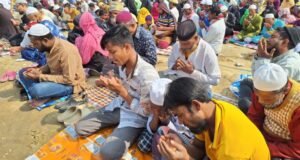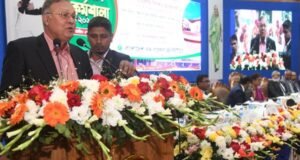 Australian leader Tony Abbott says an asylum-seeker protest at an offshore detention
Australian leader Tony Abbott says an asylum-seeker protest at an offshore detention
camp has been “broken”.
His comments came after guards at the Manus Island camp in Papua New Guinea (PNG)
entered a compound where hunger-striking detainees had barricaded themselves in.
Some asylum seekers were reportedly arrested in the operation, which came amid an
intensifying week-long protest.
But a campaigner says hundreds of asylum seekers remain on hunger strike.
Australia sends all asylum seekers arriving by boat to camps in PNG and the Pacific
territory of Nauru for detention and processing.
The policy of detaining asylum seekers offshore – intended as a deterrent – has been
criticised by rights groups.
Reports from the centre are hard to verify. The media is not allowed access to the site and
statements from officials and refugee advocates cannot be confirmed independently.
‘Degree of force’
Protests began at the Manus Island camp last week and two days ago reports emerged
that some detainees had barricaded themselves into one compound.
Guards, reportedly wearing riot gear, entered the compound on Monday afternoon.
“There was a well-organised, well-coordinated protest in some parts of the Manus centre.
It amounted to a blockade,” Mr Abbott said.
“The important thing is that order has been restored,” he added. “The blockade of the
compound had been lifted.”
Australian Immigration Minister Peter Dutton said a “degree of force” was used, but said
the situation “didn’t escalate to the point where the police had to present themselves and
be in conflict with the people that are in the centre”.
Ian Rintoul, a spokesman for campaign group Refugee Action Coalition, told the BBC 58
people had been arrested.
The guards are said to have been searching for alleged detainee ring-leaders, who have
been accused by Australian authorities of instigating the protest.
Several detainees are said to have been taken to a solitary confinement unit at the centre.
There were also reports of minor injuries, mainly among the detainees.
The situation at the other compounds at the camp is not clear. According to Mr Rintoul,
hundreds of asylum seekers are still on hunger strike.
On whether protests continued at the centre, Mr Dutton said: “There will still be some
people who refuse to take water or food and will self-harm and we don’t want to see that.”
Resettlement plans
Tensions have escalated at the centre since the protest began last Tuesday. Several
detainees have reportedly been harming themselves by sewing their lips together and
swallowing blades and washing power.
The health of those on hunger strike has worsened, with accusations that the authorities
stopped providing water, as well as food, to some detainees.
However, the authorities denied this, instead accusing the detainees of preventing the
deliveries. Mr Dutton has also accused the asylum seekers of aggressive and disruptive
behaviour.
The detainees are reportedly protesting against a plan to move those of them who have
been officially recognised as refugees to Lorengau, the capital of Manus province.
The detainees are said to be afraid that they will be attacked by local people if they are
moved to Lorengau.
The Manus Island centre was the scene of deadly riots last February, when local residents
entered the facility and clashed with detainees. One asylum seeker was killed and at least
70 were hurt in the violence.
Under laws brought in by the previous government, none of the people held in offshore
camps can expect to be resettled in Australia – even if they are found to be genuine
refugees.
The government says its tough policies are aimed at ending the flow of boats carrying
asylum seekers, so that no more people die making the dangerous journey to Australia.
Only one such boat reached Australia during 2014, compared with the 401 which
successfully reached shore in 2013, according to local media reports.
 Weekly Bangla Mirror | Bangla Mirror, Bangladeshi news in UK, bangla mirror news
Weekly Bangla Mirror | Bangla Mirror, Bangladeshi news in UK, bangla mirror news





